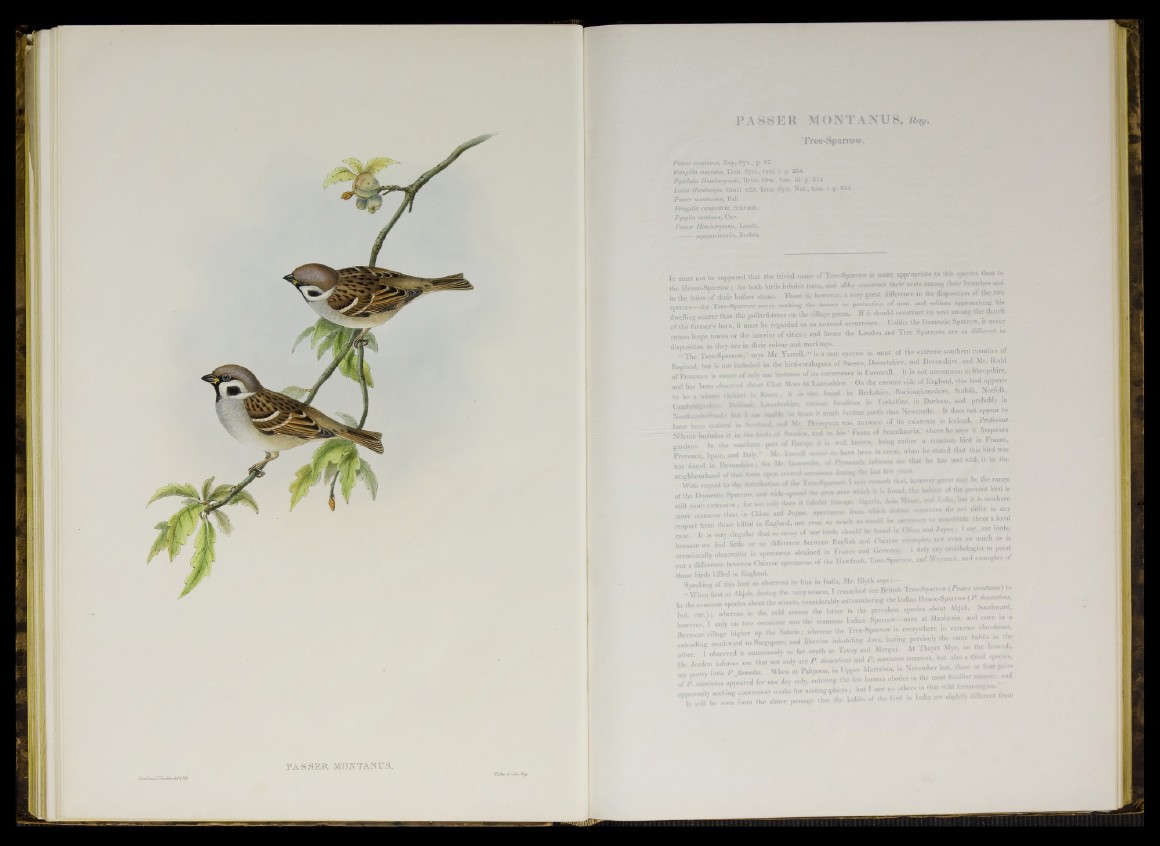
PASSER MQNTANITS.
P A S S E R M O N T A N U S , % .
Tree-Sparrow.
Passer montanus, Ray, Syn., p. 87.
Fringxlla montana, Linn. Syst., tom. i p. 234.
Pyrrhula Hamburgensis, Briss. Om.,- tom. iii. p.
. 314.
Lamia Hamburgia, Gmel. edit. Linn. Syst. Nat., tom. i. p. 854.
Passer montanina, Pall.
Fringilla campestris, Schrank.
Pyrgita montana, Cuv.
Passer Hamburgensis, Leach.
—■— septentrionalis, Brehm.
It must not be supposed that the trivial uame o f Tree-Sparrow is more appropriate to this spee.es than to
the House-Sparrow ; for both birds inhabit trees, and alike construct their nests among them branches and
in the holes o f their hollow stems. There is. however, a very great difference in the disposition ol the two
species—the Tree-Sparrow never seeking the favour o r protection of man. and seldom approaching his
dwelling nearer than the pollard-trees on the village green. If it should construct its nest among the thatch
o f the farmer’s barn, it must be regarded as an unusual occurrence. Unlike the Domestic Sparrow, it never
enters large towns o r the interior of cities ; and hence the London and Tree Sparrows are as different in
disposition as they a re in their colour and markings.
■'Thè Tree-Sparrow,” says Mr. Yarrell, is a rare species in most of the extreme southern counties ot
England but is not included in the bird-catalogues o f Sussex, Dorsetshire, and Devonshire, and Mr. Rodd
o f Penzance is aware o f only one instance o f its occurrence in Cornwall. It is not uncommon in Shropshire,
mt Chat Moss in Lancashire. On the eastern side of England, this bird appears
Essex • it is also found in Berkshire, Buckinghamshire, Suffolk, Norfolk,
Lincolnshire various localities in Yorkshire, in Durham, and probably in
n mi»Me to trace it much further north than Newcastle. I t does not appear to
and has been observe
to be a winter visiu
Cambridgeshire, Hu
Northumberland: ho
have been noticed ii
Nilssonlnciudes it In the birds o
gardens. In the southern part
Provence. Spain, aud Italy. ” Mr. Yarrell t.1 have been i„ error, when he stated that this bird was
not found in Devonshire: for Mr. tiatcomlw, - Plymouth, inform, me that he has met with it ... the
Mr. Thompson was unaware of its existence in Ireland. Professor
Sweden, aud lu his ' Fauna of Scandinavia,’ where he says it frequents
of Europe it is well known, being rather a common bird in France
o f the D o , L i e Sparrow, aud w ^ p r e - l , e
still more extensive, for not only does it » h u b . ^ ^ ^ i i f f a a „y
more common than in China and Japan, j b t0 constitute them a local
resnect from those killed in England, not even so much as would be « B M W
race It is very singular th at so many o f our birds should be found in C W and J a p a n ; I say, our birds,
because we find little or no difference between English aud Chinese examples, not even so much us is
1 7 y observable in specimens obtained in France and Germany. 1 defy any ornithologist to pom
out a difference between Chinese specimens of the Hawfinch, T r e e - S p a r r o w . and Wryneck, aud examples of
those birds killed in England.
Tree-Sparrow ( P c s ie r ,— ) to
be the common species about the S treets, considerably outnumbering the India., Honse-SpurrowCJ .
I i i.oi. . whereas in the cold season the latter is the prevalent species about Akjab. Southward,
however V only on two occasions saw the common Indian S p a n w - o u e c .at Manlmein, and once ... a
Burmese village higher up the Sulwiu; whereas the Tree-Sparrow is everywhere in extreme abundance,
extending southward to Singapore, and likewise inhabiting Java, having prrcnselythe same M * » *
other I observed it numerously as far south as Tuvoy and Mergui. At Thayet Myo, o
Dr. Jerdon informs me that not only are P . J and P . mentonus ^
[trcttv little P .flw o lm . When at Pahpoon, in Upper Martaban, m November last three lour ,
Of P. montanus appeared for one day only, entering the few human abodes in the mort t o l h a r m a ^ »
apparently seeking convenient nooks for nesting-places; but I saw no o t b e r s in th « w,U f o ^ w ^ m a .
It will he seen from the above passage that the habits of the lord m India are slightly different from